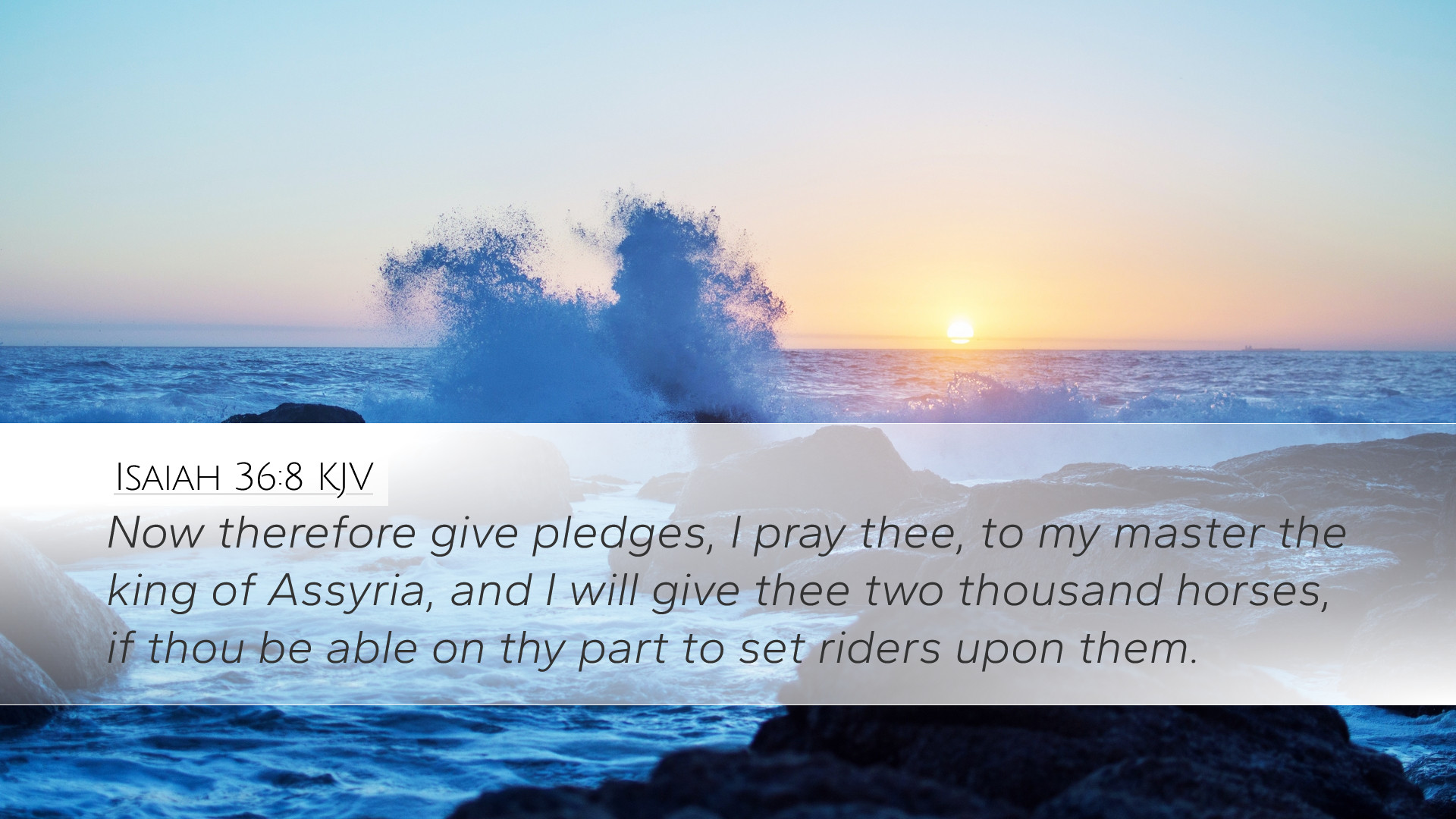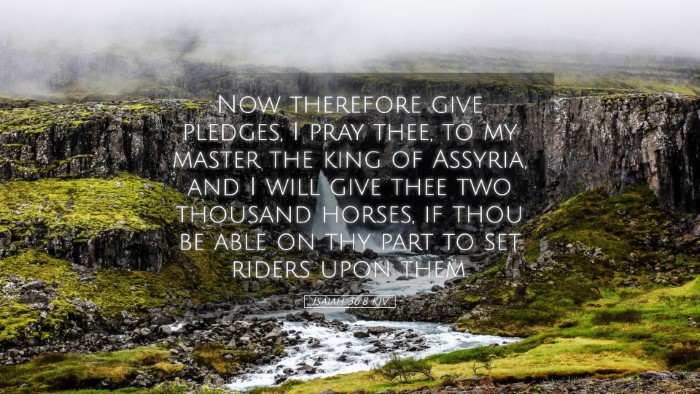Commentary on Isaiah 36:8
Verse Reference: Isaiah 36:8 - "Now therefore, give pledges to my master the king of Assyria, and I will give you two thousand horses, if you are able on your part to set riders upon them."
Introduction
In this verse, we encounter a pivotal moment during the Assyrian siege of Jerusalem. Isaiah 36:8 forms part of a larger narrative concerning the Assyrian king Sennacherib's threats against Judah, specifically targeting King Hezekiah. The verse reveals the psychological warfare employed by the Assyrians, intended to demoralize and intimidate not only the king but also the people of Jerusalem.
Contextual Analysis
The backdrop of this verse is set in the historical context of the Assyrian Empire's expansion and its military campaigns against smaller nations. Isaiah, serving as a prophet, repeatedly warned Judah of the consequences of turning away from God, yet His mercy prevailed, preserving a remnant. The Assyrian envoy, Rabshakeh, thus stands as a representation of human pride and the attempt to undermine divine sovereignty.
Key Insights from Commentaries
Matthew Henry’s Commentary
On the offer of horses: Matthew Henry emphasizes the significance of Rabshakeh's challenge to Judah's military sufficiency. The proposal of 2,000 horses illustrates a larger point about reliance on human strength versus divine aid. Henry notes that the Assyrian leader's taunts aim to diminish the Israelites' faith, implying that no earthly alliance could suffice against the might of Assyria.
On the spiritual implications: Henry further expounds that such a moment reflects the human propensity to seek security in material means. This serves as a reminder that faith must not rest in political machinations or military might but solely in the Lord God, who has the ultimate sovereign control over the nations.
Albert Barnes’ Notes
On pledges to the king: Albert Barnes interprets the phrase "give pledges" as an indication of the Assyrian strategy to induce capitulation. By demanding a show of allegiance and offering horses as an incentive, the Assyrians sought to bear down on the weakened resolve of the Judeans.
On the feasibility of military aid: Barnes points out the absurdity in Rabshakeh's proposition, as setting riders on the offered horses would require substantial military preparedness that Judah lacked. Thus, their military impotence is starkly highlighted, showcasing their plight and the futility of their efforts to resist Assyrian dominance without divine intervention.
Adam Clarke’s Commentary
On the military challenge: Adam Clarke notes that Rabshakeh not only invites Judah to a military alliance but underscores the insignificance of their current defenses. Clarke remarks that this tactic is characteristic of military leaders who seek to dismantle enemy morale by showcasing their own strengths while belittling opposition.
On reliance on God: Clarke’s insights reflect on the underlying truth of the matter: reliance cannot be placed in numbers or military technology. He articulates that, without trust in God, the efforts of Judah are destined for failure, making a poignant observation about the human condition and spiritual desolation.
Theological Themes
- Human Insecurity: This verse encapsulates the very essence of human insecurity—despite abundant offers and military support, without divine backing, all is in vain.
- Diplomatic Pressure: The pressure exerted by Assyria symbolizes the broader spiritual battles faced by believers today, encouraging reliance on God amid external pressures.
- The Sovereignty of God: Central to this commentary is the assertion of God’s sovereignty, evidenced by the prophetic assurance that He alone can save Judah.
- Faith versus Fear: This narrative reflects the struggle of faith against fear; trusting in God's deliverance amidst overwhelming circumstances is paramount.
Practical Applications
The commentary on Isaiah 36:8 provides crucial insights for pastors, students, and scholars. It teaches the importance of trusting in God’s power rather than succumbing to human anxiety fueled by overwhelming circumstances. Reflect on the following applications:
- In Leadership: Leaders should prioritize spiritual counsel over mere political strategy. Seeking God’s will must precede any earthly alliances.
- In Personal Struggles: Individuals must remember that earthly challenges and pressures can never overshadow God's providential care and power.
- In Community Engagement: Faith communities should encourage one another in cultivating a robust faith that can withstand external pressures and fears.
Conclusion
Isaiah 36:8 serves as a profound reminder of the need for unwavering faith in God amidst dire circumstances. The collective wisdom from the commentators highlights that true strength lies not in human alliances or resources but in reliance upon the omnipotent God. This verse invites deep reflection on our sources of security and the importance of trusting in divine might over earthly power. For pastors, students, theologians, and scholars alike, the message of Isaiah echoes profoundly—the church must be fortified through faith, grounded in God's promises, and ready to stand firm in the face of adversity.


